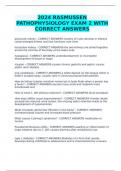Childhood gigantism - Study guides, Class notes & Summaries
Looking for the best study guides, study notes and summaries about Childhood gigantism? On this page you'll find 132 study documents about Childhood gigantism.
Page 3 out of 132 results
Sort by
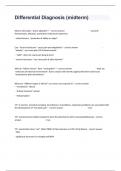
-
Differential Diagnosis (midterm) Exam Written With Complete Questions And Answers.
- Exam (elaborations) • 32 pages • 2024
-
Available in package deal
-
- $15.99
- + learn more
Differential Diagnosis (midterm)- anterior/posterior *thoracolumar region* What are some common *pulmonary pathologies*? - correct answer - bronchitis - pneumonia - emphysema - asthma - cystic fibrosis (CF) - tuberculosis (TB) - lung cancer - cor pulmonale - pneumothorax What are some *pulmonary symptoms*? - correct answer - *substernal* pain - *localized* (can radiate to neck and shoulde...
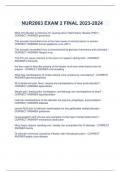
-
NUR2063 EXAM 2 FINAL 2023-2024
- Exam (elaborations) • 4 pages • 2023
-
Available in package deal
-
- $11.99
- + learn more
NUR2063 EXAM 2 FINAL What STI disorder is notorious for causing pelvic inflammatory disease (PID)? - CORRECT ANSWER-gonorrhea This sexually transmitted virus is the main cause of cervical cancer in women - CORRECT ANSWER-human papilloma virus (HPV) This sexually transmitted virus is characterized by periods of dormancy and outbreaks - CORRECT ANSWER-Herpes virus This STI can cause infection in the eyes of a newborn during birth - CORRECT ANSWER-Chlamydia the term used to describe pass...
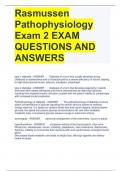
-
Rasmussen Pathophysiology Exam 2 EXAM QUESTIONS AND ANSWERS
- Exam (elaborations) • 12 pages • 2023
-
- $12.99
- + learn more
Rasmussen Pathophysiology Exam 2 EXAM QUESTIONS AND ANSWERS type 1 diabetes - ANSWER Diabetes of a form that usually develops during childhood or adolescence and is characterized by a severe deficiency of insulin, leading to high blood glucose levels. polyuria, polydipsia, polyphagia. type 2 diabetes - ANSWER Diabetes of a form that develops especially in adults and most often obese individuals and that is characterized by high blood glucose resulting from impaired insulin ut...
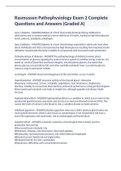
-
Rasmussen Pathophysiology Exam 2 Complete Questions and Answers (Graded A)
- Exam (elaborations) • 7 pages • 2023
-
Available in package deal
-
- $14.49
- + learn more
type 1 diabetes - ANSWER Diabetes of a form that usually develops during childhood or adolescence and is characterized by a severe deficiency of insulin, leading to high blood glucose levels. polyuria, polydipsia, polyphagia. type 2 diabetes - ANSWER Diabetes of a form that develops especially in adults and most often obese individuals and that is characterized by high blood glucose resulting from impaired insulin utilization coupled with the body's inability to compensate with increased ins...
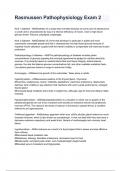
-
Rasmussen Pathophysiology Exam 2 questions and answers graded A+ 2024/2025
- Exam (elaborations) • 7 pages • 2024
- Available in package deal
-
- $11.49
- + learn more
Rasmussen Pathophysiology Exam 2 questions and answers graded A+ 2024/2025
2024 RASMUSSEN PATHOPHYSIOLOGY EXAM 2 WITH CORRECT ANSWERS
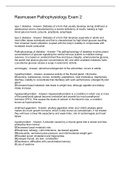
-
Rasmussen Pathophysiology Exam 2
- Exam (elaborations) • 6 pages • 2023
-
- $9.99
- + learn more
type 1 diabetes - Answer- Diabetes of a form that usually develops during childhood or adolescence and is characterized by a severe deficiency of insulin, leading to high blood glucose levels. polyuria, polydipsia, polyphagia. type 2 diabetes - Answer- Diabetes of a form that develops especially in adults and most often obese individuals and that is characterized by high blood glucose resulting from impaired insulin utilization coupled with the body's inability to compensate with increased i...
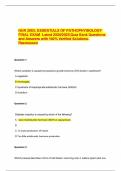
-
NUR 2063; ESSENTIALS OF PATHOPHYSIOLOGY FINAL EXAM Latest 2024/2025;Quiz Bank Questions and Answers with 100% Verified Solutions-Rasmussen
- Exam (elaborations) • 58 pages • 2024
- Available in package deal
-
- $7.99
- + learn more
NUR 2063; ESSENTIALS OF PATHOPHYSIOLOGY FINAL EXAM Latest 2024/2025;Quiz Bank Questions and Answers with 100% Verified Solutions-Rasmussen NUR 2063; ESSENTIALS OF PATHOPHYSIOLOGY FINAL EXAM Latest 2024/2025;Quiz Bank Questions and Answers with 100% Verified Solutions-Rasmussen Question 1 Which condition is caused by excessive growth hormone (GH) levels in adulthood? A Gigantism B Acromegaly C Syndrome of inappropriate antidiuretic hormone (SIADH) D Dwarfism ...

-
BLOCK 3 PMY 302 - DRUGS to KNOW Exam Study Guide with Complete Solutions
- Exam (elaborations) • 35 pages • 2024
-
- $12.49
- + learn more
BLOCK 3 PMY 302 - DRUGS to KNOW Exam Study Guide with Complete Solutions Somatropin Drug Class - Answer️️ -Synthetic recombinant human growth hormone Somatropin MOA - Answer️️ -Identical in action and abilities like endogenous secreted GH (stimulating proliferation of bone growth plates and increased linear bone growth, promotion of protein synthesis throughout the body) Somatropin/Somatrem dosing - Answer️️ -Daily dosing dependent and adjusted to individual clinical response...

-
Test: The Endocrine System Questions and Answers Graded A+
- Exam (elaborations) • 9 pages • 2023
-
Available in package deal
-
- $9.99
- + learn more
Test: The Endocrine System Questions and Answers Graded A+ the organ that responds to the action of a hormone is known as the _______ organ. a) acting b) target c) regulation d) feedback e) promotion b ________ hormones usually pass through the cell membrane by diffusion a) steroid b) exocrine c) G protein d) Peptide e) Polypeptide a the protein that is found embedded in the cell membrane and allows the hormone to bind to it is known as the ______. a) mRNA b) secondary messenger c) receptor d...

Study stress? For sellers on Stuvia, these are actually golden times. KA-CHING! Earn from your study resources too and start uploading now. Discover all about earning on Stuvia



